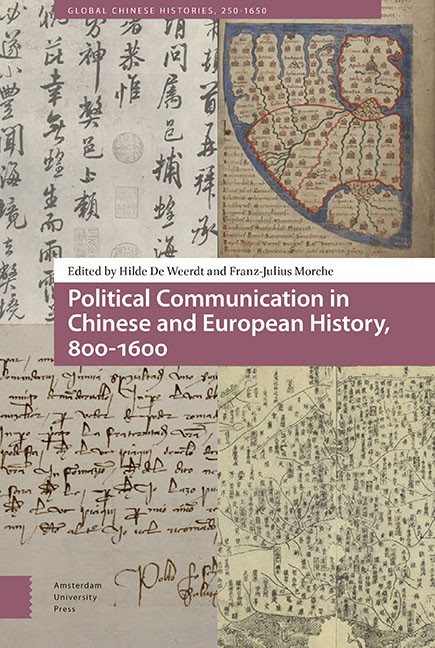Book contents
- Frontmatter
- Dedication
- Contents
- List of Figures and Tables by Chapter
- Acknowledgments
- Introduction
- Part I Communication and the Formation of Polities
- Part II Letters and Political Languages
- Part III Communication and Political Authority
- Part IV Memory and Political Imaginaries
- Epilogues
- List of Contributors
- Index
9 - The Printers’ Networks of Chen Qi (1186–1256) and Robert Estienne (1503–1559): A Micro-Comparative Approach to Political Dependence and Censorship
Published online by Cambridge University Press: 17 June 2021
- Frontmatter
- Dedication
- Contents
- List of Figures and Tables by Chapter
- Acknowledgments
- Introduction
- Part I Communication and the Formation of Polities
- Part II Letters and Political Languages
- Part III Communication and Political Authority
- Part IV Memory and Political Imaginaries
- Epilogues
- List of Contributors
- Index
Summary
Abstract
This chapter aims to demonstrate the pertinence of micro-historical sources to the comparative study of political institutions. We conduct two case studies of urban intellectual circles in thirteenth-century Song China and sixteenth-century France, comparing the intellectual output and personal networks of the Parisian printer Robert Estienne and of Chen Qi, a publisher in the Southern Song capital Hangzhou. Robert Estienne built his father's printing business into a formidable European publishing house, publishing more than 500 works in his lifetime and gaining eminence as a scholar of Greek and the New Testament. His differences with the theological faculty of Paris over his critical editions of the bible eventually led him to move his workshop to Geneva. Some 300 years earlier, Chen Qi was exiled from Hangzhou following his publication of the Rivers and Lakes Collection 江湖集 (Jianghu ji), which was deemed slanderous against the Southern Song Chief Councillor Shi Miyuan. The juxtaposition of the two cases allows us to inquire into the political dimension of their publishing activity and to contextualize the micro-historical narratives within regional histories of institutional development: to what extent were Chen Qi and Robert Estienne subjected to political arbitrariness? Was the forced exile and temporary character demolition of Chen Qi, compared to the career-enhancing self-exile of Robert Estienne, the result of a weaker institutionalization of censorship? What role did personal networks play in the development of political patronage?
Keywords: Chen Qi, Robert Estienne, censorship, Reformation, Southern Song (Chinese) Renaissance
The question of whether and how governments may interfere with the free distribution of the written word is as current as it is politically and historically controversial. This is particularly the case from a Sino-European comparative perspective. While contemporary China continues to attract both domestic and international criticism for stifling its citizens’ freedom of expression through, for example, restrictions on internet use, European democracies are no strangers to controversy either. Incidents such as the terrorist attack on the Charlie Hebdo offices in January 2015, widely seen as an Islamist response to the satirical newspaper's publication of cartoons depicting the Prophet Mohammed, have triggered calls to restrict the reach of political satire. ‘Anti-platforming’ movements seeking to prevent the public pronouncement of perceived extremist views pose a challenge to media organizations and educational institutions alike, while social media providers are being pressured to prohibit contents that are deemed disruptive to social cohesion.
- Type
- Chapter
- Information
- Publisher: Amsterdam University PressPrint publication year: 2021



